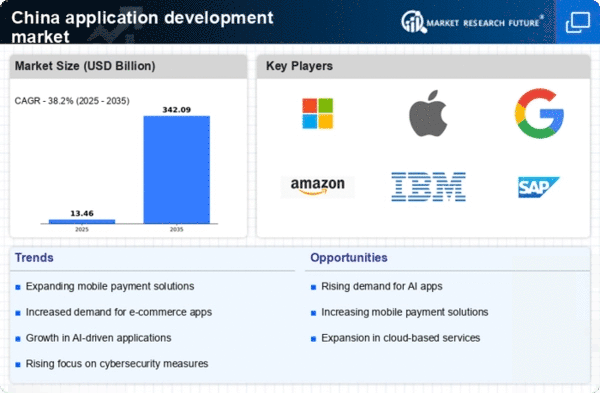Surge in Mobile Device Usage
The proliferation of mobile devices in China has catalyzed a substantial demand for applications tailored to these platforms. As of 2025, mobile internet penetration in China stands at approximately 70%, indicating a robust user base for mobile applications. This trend is likely to drive the application development market, as businesses seek to capitalize on the growing number of mobile users. Furthermore, the increasing reliance on mobile applications for daily activities, such as shopping, banking, and social networking, suggests that developers must prioritize mobile-first strategies. Consequently, the application development market is expected to witness a surge in projects aimed at enhancing user experience and functionality on mobile devices, thereby fostering innovation and competition among developers.
Adoption of Cloud Technologies
The adoption of cloud technologies in China is reshaping the application development market by enabling more scalable and flexible solutions. As businesses increasingly migrate to cloud-based infrastructures, the demand for applications that leverage these technologies is on the rise. By 2025, it is estimated that over 60% of enterprises in China will utilize cloud services, creating a significant opportunity for developers. This shift allows for faster deployment, reduced costs, and enhanced collaboration among development teams. Consequently, the application development market is likely to experience growth driven by the need for cloud-compatible applications that can meet the demands of modern businesses.
Expansion of E-commerce Platforms
The rapid expansion of e-commerce in China has created a fertile ground for the application development market. With online retail sales projected to reach $2 trillion by 2025, businesses are increasingly seeking custom applications to enhance their e-commerce capabilities. This demand is driving developers to create innovative solutions that streamline shopping experiences, integrate payment systems, and improve customer engagement. Furthermore, the rise of social commerce, where social media platforms facilitate shopping, indicates a shift in consumer behavior that developers must address. As a result, the application development market is likely to see a surge in projects focused on e-commerce functionalities, catering to the evolving needs of both businesses and consumers.
Government Initiatives and Support
The Chinese government has been actively promoting digital transformation across various sectors, which has a direct impact on the application development market. Initiatives such as the 'Internet Plus' strategy aim to integrate internet technologies with traditional industries, thereby creating new opportunities for application developers. In 2025, government funding for technology startups is projected to exceed $10 billion, providing a financial boost to emerging developers. This support not only encourages innovation but also enhances the overall ecosystem for application development. As a result, the application development market is likely to experience accelerated growth, driven by both public and private sector investments in technology and digital solutions.
Increased Focus on User Experience
In the competitive landscape of the application development market, user experience (UX) has emerged as a critical differentiator. Chinese consumers are becoming increasingly discerning, demanding applications that are not only functional but also intuitive and engaging. As of 2025, studies indicate that applications with superior UX can achieve up to 30% higher user retention rates. This trend compels developers to invest in research and design processes that prioritize user-centric features. Consequently, the application development market is witnessing a shift towards methodologies that emphasize usability testing and iterative design, ultimately leading to more successful applications that resonate with users.
















